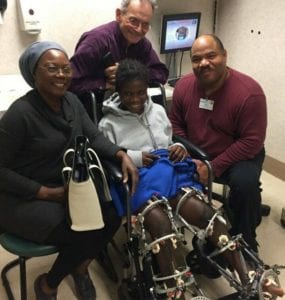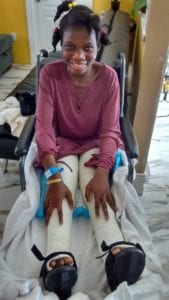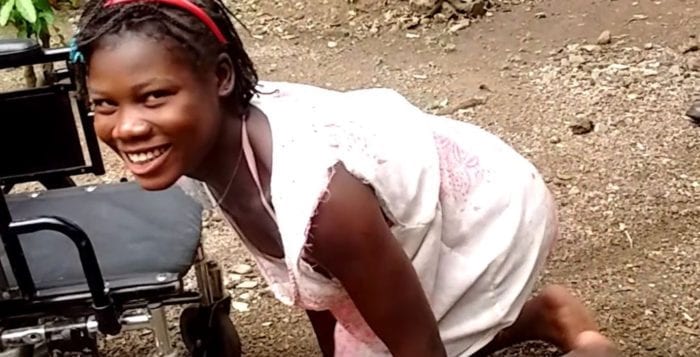A teen born with two clubbed feet is closer to her dream of walking on her own thanks to the efforts of Long Islanders and Stony Brook University Hospital.
When Steve Kramer, a retired Brookhaven National Laboratory accelerator physicist, traveled to Haiti last year through Life & Hope Haiti, a nonprofit founded by Haitian-American Lucia Anglade, he never knew what a profound impact his trip would have on one student’s life. It was while working at the Eben-Ezer School, built by Anglade in Milot, Haiti, he met 16-year-old Berlinda, who would crawl to get from one spot to another.

Moved by her struggles, Kramer reached out to Dr. Wesley Carrion at Stony Brook University School of Medicine’s Department of Orthopaedics about performing surgery to fix Berlinda’s feet. Kramer sent the doctor copies of her X-rays, and Carrion told him he felt he could treat her and rotate the feet. He agreed to do it free of charge, donating his time and equipment.
“We looked at her and felt she had a fairly good chance of standing,” Carrion said.
After Carrion performed surgery on Berlinda in November, fixators — external frames that are attached by pins drilled into leg bones -— were used to rotate her feet to stretch the tendons. After the fixators were in place, Berlinda received outpatient services from the hospital, and she stayed at Anglade’s home on Long Island, according to Kramer.
The fixators were removed March 9 and Berlinda was put in leg casts until March 19. She has been working with physical therapists at the hospital, and while she can stand with braces with help, she has a long way to go before she can stand on her own.
“She was crawling around her village. She was unable to stand, so when we got her up with physical therapy, those were literally her first steps.”
— Dr. Wesley Carrion
Kramer said she has to build up strength, and she feels a lot of pain when she moves her left knee as it is locking up after not being used for months. However, he said she was pleased to be out of the fixators, which caused her pain at times.
Carrion said fixators can be painful, and when Berlinda’s wheelchair would hit bumps, the pain would increase.
“It’s tough when you got these fixator frames on that look like giant tinker toys that you attach to the limbs,” Carrion said. “They’re things that hurt. They’re things that are uncomfortable.”
Carrion said it’s difficult to determine if Berlinda will stand without braces. She had polio and did not receive proper treatment, and also has spina bifida. Carrion said despite a hole in her spinal column, it hasn’t presented any problems.
“If we can get her walking with braces, that’s a huge win,” Carrion said. “She was basically crawling around her village. She was unable to stand, so when we got her up with physical therapy, those were literally her first steps.”
Kramer said the hope is for Berlinda to stay until she completes physical therapy, which will take a few months, since she will receive better treatment in Stony Brook than in Haiti. To help with Berlinda’s airfare and outpatient expenses, Kramer set up a GoFundMe page.

He said with money from that account, he can buy physical therapy equipment, like parallel bars so she can practice standing and walking outside of physical therapy treatments.
Kramer said during Berlinda’s stay in New York, it was the first time she saw snow, and he showed her how to make a snowball.
“She knew what to do with it,” Kramer said. “She wanted to throw it at me, and she did.”
Kramer said Berlinda, who will turn 17 April 13, loves learning, and despite attending school for only one year, easily solved basic arithmetic problems when he first met her.
“She never lost that bright smile and willingness to work with whatever she had,” Kramer said, adding that sometimes those with handicaps in her village are shunned and even her siblings have bullied her.
When Kramer first approached Carrion, the doctor informed him that he would also need to get the hospital to donate some of the costs for the November surgery. It was then Kramer reached out to Department of Medicine’s Dr. L. Reuven Pasternak, who serves as vice president for health systems and chief executive officer of Stony Brook University Hospital. Pasternak said requests like Kramer’s to waive charges are not unusual from doctors and members of the community.
“She never lost that bright smile and willingness to work with whatever she had.”
— Steve Kramer
“We do this from time to time, and the way it usually occurs is that a physician encounters somebody, oftentimes overseas, and in the course of doing a medical mission or in their travels,” Pasternak said. “And it’s somebody who has a correctable medical condition that will make a huge impact on their lives.”
While Pasternak was out of town during the surgery and hasn’t met Berlinda yet, he said Kramer and Carrion have kept him informed about her recovery and follow-up treatment.
“It’s a testimony to cooperation and collaboration because it required a lot of people to step up and say that this is important to do and basically volunteer to do it,” he said.
For more information about fundraising efforts to help Berilnda, visit www.gofundme.com/berlindasmiracle. To find out more about Life & Hope Haiti or to get involved, visit www.lifeandhopehaiti.org.





